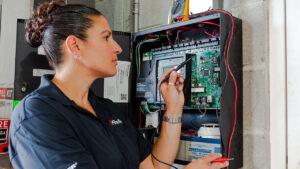
A successful fire protection systems inspection needs to be comprehensive, and preferably handled by fire system professionals.
Fire protection systems are a critical part of any commercial or residential building’s safety plan. Regular fire protection systems inspection ensures that all components are working properly, providing maximum defense against fire hazards. Regardless of what type of commercial property you own or manage, understanding what goes into a thorough inspection can help you stay compliant and protect lives and property.
Sprinkler System Inspection
The sprinkler system is often the first line of defense in the event of a fire. During a fire protection systems inspection, technicians will:
- Check for corrosion, leaks, or physical damage
- Verify that sprinkler heads are unobstructed and properly spaced
- Inspect control valves to ensure they are open and operational
- Test water pressure and flow rates
- Confirm that gauges are reading accurately
Regular inspection and testing of sprinklers, as required by NFPA 25 standards, ensure these systems can activate effectively in an emergency.
Fire Alarm System Testing
A working fire alarm system provides crucial early warning that allows for safe evacuation. A proper inspection includes:
- Testing manual pull stations and automatic detection devices (smoke and heat detectors)
- Verifying alarm signals reach the monitoring station
- Ensuring strobe lights, sirens, and speakers function correctly
- Checking control panel functionality and backup power sources
Fire alarm inspections are typically required at least once per year, depending on local codes and system complexity.
Fire Extinguisher Inspection
Portable fire extinguishers are often overlooked, but they’re vital for controlling small fires before they grow. During an inspection, professionals will:
- Ensure each extinguisher is mounted in its designated location
- Check for clear labeling and visibility
- Verify pressure gauge readings
- Inspect the hose, nozzle, and handle for damage
- Check inspection tags and perform hydrostatic testing if required
Fire extinguishers should be visually inspected monthly and receive annual maintenance from a certified technician.
Standpipe and Fire Hose System Check
For buildings with standpipe systems and fire hose connections, a fire protection systems inspection includes:
- Verifying hose connections are accessible and not damaged
- Checking for leaks, corrosion, or obstructions
- Testing water flow and pressure
- Ensuring proper labeling and signage
These systems are crucial in high-rise buildings and must be ready for use by fire departments and trained personnel.
Emergency and Exit Lighting Inspection
Clear and illuminated paths to exits are essential during an emergency. This part of the inspection includes:
- Testing battery backup systems
- Verifying exit signs are lit and visible
- Checking for proper placement and compliance with code requirements
Working exit lighting helps prevent injuries during evacuations and is often overlooked during routine checks.
Fire Pump Testing
In larger facilities, fire pumps help maintain water pressure to sprinkler and standpipe systems. Inspections should include:
- Testing pump start-up from automatic signals
- Measuring pressure levels and flow rates
- Inspecting for mechanical wear, leaks, or vibration issues
- Checking fuel, oil, and battery levels (for diesel-powered pumps)
Annual full-flow testing and weekly no-flow testing are often required to keep fire pumps in peak condition.
Compliance and Documentation
A comprehensive fire protection systems inspection also includes reviewing documentation. Inspectors will:
- Ensure logs of previous inspections and maintenance are up-to-date
- Confirm compliance with NFPA codes and local fire regulations
- Provide a detailed report highlighting any deficiencies and recommendations for repairs
Proper documentation is crucial for passing insurance audits, fire marshal inspections, and maintaining occupant safety.
Fire Protection Services from Fireline
Whether you need smoke detectors, fire extinguishers, or an automatic sprinkler system installed at your commercial property, Fireline has you covered. We have been protecting people and property from fire damage since 1947—and our experience shows in our excellent work! We are known for our superb customer service, our expertise, and our reliability. For more information on how we can help your residential or commercial property, visit us online or give us a call at (800) 553-3405. We are in Baltimore, MD, with a second office in Leesburg, VA. For more fire safety tips, be sure to follow us on Facebook, Twitter, and LinkedIn.
